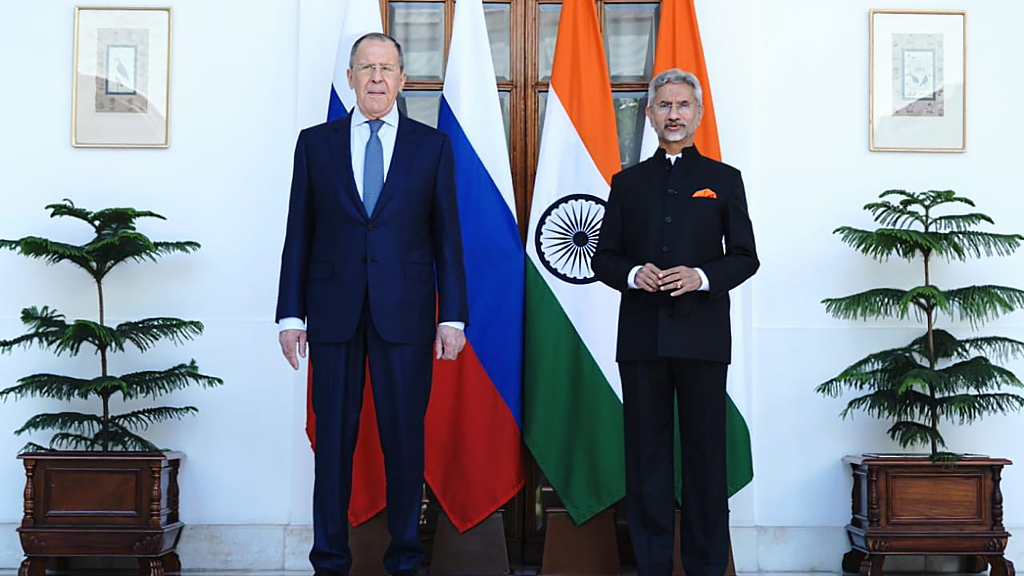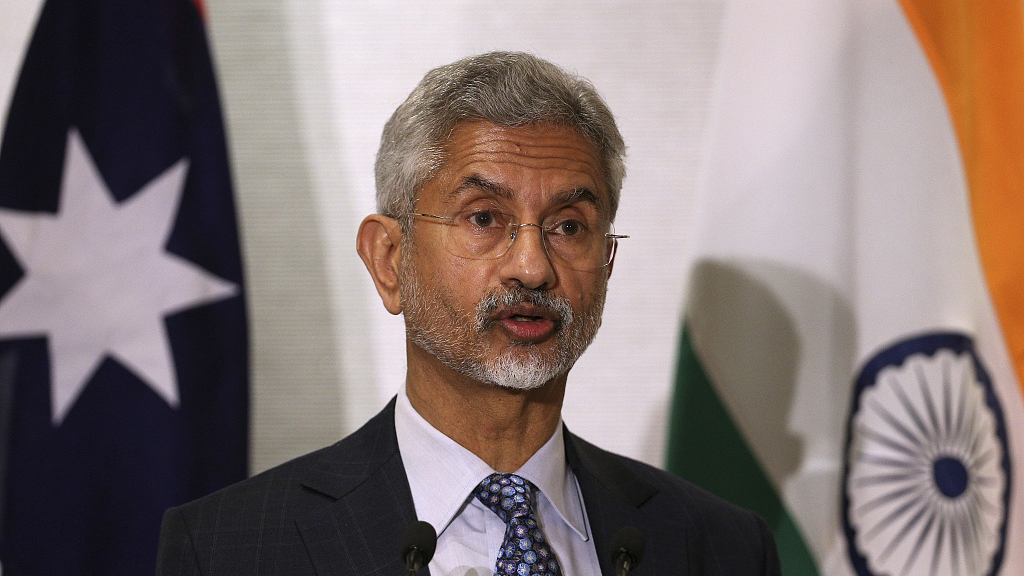
Indian Foreign Minister S. Jaishankar (R) and his Russian counterpart Sergey Lavrov stand for photographs before their meeting in New Delhi, India, April 1, 2022. /VCG
Indian Foreign Minister S. Jaishankar (R) and his Russian counterpart Sergey Lavrov stand for photographs before their meeting in New Delhi, India, April 1, 2022. /VCG
Editor's note: Rabi Sankar Bosu is an Indian contributor to Chinese media outlets. He writes about Chinese politics, social and cultural issues, and China-India relations with a special interest in the Belt and Road Initiative. The article reflects the author's opinions and not necessarily those of CGTN.
Amid the conflict in Ukraine, Russian Foreign Minister Sergey Lavrov paid a two-day visit to the Indian capital New Delhi from March 31 to April 1 on the heels of a two-day visit to China. His India trip was aimed at mending old ties with India in the current geopolitical situation.
Lavrov's visit to India held special significance as this was the first visit by Russia's top diplomat to India after Russia's "special military operation" began in Ukraine last month. More importantly, his visit took place at a critical time when the U.S. and others are trying to damage relations between India, Russia and China. From the very beginning of the Ukraine crisis, the U.S. did not succeed in persuading India to criticize Russia.
As such, the announcement of Lavrov's visit captured much attention from the U.S.-led Western countries as evidenced by the phone call of U.S. Secretary of State Antony Blinken to India's External Affairs Minister Subrahmanyam Jaishankar. Blinken asked the Indian foreign minister to discuss the Ukraine situation with U.S. Deputy National Security Advisor Daleep Singh who was on a visit to New Delhi from March 30 to 31.
It's reported that during the meeting between Lavrov and Jaishankar, as well as separately with Prime Minister Narendra Modi on April 1, both sides exchanged views on several issues such as the Russia-Ukraine conflict and bilateral relations, from defense to investment. The Russian minister informed India in detail about the situation in Ukraine and the direction of peace talks with Ukraine.
On the other hand, Prime Minister Modi conveyed the message of peace in all its forms, reiterating his call for an early cessation of violence in the Ukraine-Russia conflict. India is all set to back peace efforts to resolve the conflict.
In the wake of the Russia-Ukraine conflict, India's stance on Russia invited sharp criticism from the U.S. and its Western allies. Despite being a partner of the U.S.-led Quad alliance comprising the U.S., India, Australia and Japan, India did not stand by America's side over Ukraine. Ignoring the diplomatic pressure of the Western world, democratic India did not condemn Russia's military actions against Ukraine as "aggression" which visibly reflects India's long-standing relations with Russia.
U.S. President Joe Biden criticized India's stance on Ukraine among the Quad members by stating that "The Quad is, with the possible exception of India being somewhat shaky on some of this, but Japan has been extremely strong – so has Australia – in terms of dealing with Putin's aggression." But here arises a critical question: Has the U.S. any right to dictate the course of sovereign India's foreign policy? India is paying close attention to Washington's activities in Ukraine and knows well that America's strategic focus could be shifted from the Indo-Pacific region to Europe.

India's Foreign Minister Subrahmanyam Jaishankar holds a news conference after a meeting between Australia, India, Japan and the United States, in Melbourne, Australia, February 12, 2022. /VCG
India's Foreign Minister Subrahmanyam Jaishankar holds a news conference after a meeting between Australia, India, Japan and the United States, in Melbourne, Australia, February 12, 2022. /VCG
However, it seems India has now apparently become the epicenter of geopolitics as seen by the frequent landings of foreign ministers and government officials from different countries in New Delhi. Most Western countries have mounted diplomatic pressure on India for its declared position of remaining neutral on the Russia-Ukraine conflict. India's soft attitude towards Russia has antagonized the U.S. and its Western allies.
Last week, China's State Councilor and Foreign Minister Wang Yi came to India. Undoubtedly, the Russia-Ukraine conflict has offered a unique opportunity to both China and India to improve their frosty relationship as well as to speak out in one voice against the U.S. for its failure to assume due responsibility for the Russia-Ukraine conflict. Notably, like China, from the very beginning, India has also called for direct talks between Moscow and Kyiv to normalize the hostile situation.
Many security and international relations analysts believe that the U.S. is responsible for the ongoing crisis in Ukraine. There is no doubt about one thing. The U.S. began to increase its expansionism in Ukraine through NATO by ignoring Russia's security concerns which should be the main root for the ongoing crisis.
So far, India demonstrates its commitment to a decades-old relationship with Russia. Maintaining its "strategic neutrality," India has abstained from voting on all proposals against Russia from the U.S. and its allies at the UN Security Council, General Assembly and UN Human Rights Council. India is determined to avoid the U.S.-led axis on the Ukraine issue at all costs.
India did not take part in any direct anti-Russian protests, and its stance was obliquely criticized by the U.S., saying there was "no neutral ground in this war," to quote White House Press Secretary Jen Psaki. India did not join the U.S.-led camp to impose sanctions against Russia, which the U.S. is not happy with.
Around 70 percent of India's military hardware is of Russian origin. It is now quite clear that the Biden administration will no longer exempt New Delhi from its financial sanctions on future arms purchases from Russia. The U.S. has been pressuring India not to buy the S-400 air defense systems, consisting of a nuclear submarine and surface-to-air missiles from Russia.
Encouragingly, in his talks with his Indian counterpart, Lavrov gave assurance that pending defense deals will be expedited. According to media reports, it is learnt that Russia is offering India steep discounts on the direct sale of oil.
However, India's deal with Russia for crude oil imports at discounted prices was vehemently criticized by the U.S. as the "wrong side of history." But the farce is that when India is accused of purchasing Russian oil, many western countries like Germany and France do the same.
To sum up, it can be said that the U.S. should stop lecturing India and other countries about their national interests or their relationship with Russia. It is hoped that Russia and Ukraine should resolve their differences through "honest and sincere" efforts. Let the UN be more active in arranging an immediate one-to-one meeting between Russian President Vladimir Putin and Ukrainian President Volodymyr Zelenskyy that can put an end to the ongoing conflict.
(If you want to contribute and have specific expertise, please contact us at opinions@cgtn.com. Follow @thouse_opinions on Twitter to discover the latest commentaries on CGTN Opinion Section.)

